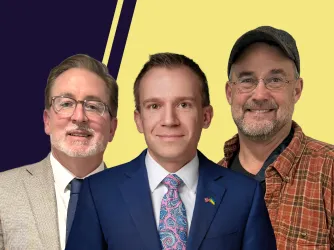Table of Contents
'The Diversity Religion at Virginia Tech'
"Pushing professors to conform to any set of beliefs is inappropriate," writes Carey Stronach, president of the Virginia Association of Scholars (VAS), in a very good article yesterday for the Pope Center's Clarion Call. Stronach writes about FIRE's case at Virginia Tech, where professors have been increasingly pressured to demonstrate "diversity accomplishments" when being assessed for the quality of their work.
Diversity sounds like a lofty goal. Who (this side of the Ku Klux Klan) is opposed to diversity? Who still favors excluding people just because of race or other innate characteristics? Those of us who marched with Dr. King in our youths should see diversity as the ultimate manifestation of our ideals.
There is nothing wrong with diversity as a goal or aspiration. And certainly, the Fourteenth Amendment, the 1964 Civil Rights Act, and many other laws require that minorities—and everyone else—receive equal treatment under the law. That is both right and just.
But that isn't the whole story. Over the past two decades, the concept of diversity has become pervasive in higher education. Unfortunately, that concept has almost nothing to do with the idea of equal treatment for all and judging people on the basis of their capabilities and accomplishments. It ignores individualism and obsesses over presumed group identities.
And now, in the name of diversity, the Virginia Tech administration proposes an Orwellian sort of thought control. As part of any application for tenure, promotion, or merit pay, faculty members must display activities in which they have been engaged that further diversity. (The history of this dispute and links to the relevant diversity documents are in this letter from the Foundation for Individual Rights in Education to Virginia Tech's rector.) That may help those who conform to the diversity philosophy, but will probably hurt those who do not.
Stronach also quotes from a very good letter sent by VAS to Virginia Tech's president, Charles Steger, last May:
For over a century, American faculty members fought hard for the right to be judged by the quality of their work rather than by their degree of conformity to various political standards. It is, apparently, a never-ending battle. As one form of loyalty oath gets chased from the scene, another arises—and always in the minds of its proponents, it is a wholesome thing. What could be wrong with requiring every faculty member to demonstrate commitment to "diversity?"
There is plenty wrong with it. ... [F]orcing faculty members to espouse an idea violates their academic freedom. It doesn't matter what the idea is. It is the coercion that is poisonous. And it doesn't become less poisonous by being made covert. Eliminating the word "required" doesn't eliminate the violation of academic freedom if the coercion continues out of sight.
Stronach is right: the coercion remains, and it is worst of all in Virginia Tech's College of Liberal Arts and Human Sciences, where a highly politicized definition of "diversity" rules:
We, the College of Liberal Arts and Human Sciences Diversity Committee, use the term "diversity" to mean the desirability andvalue of many kinds of individual differences while at the same time acknowledging and respecting that socially constructed differences based on certain characteristics exist within systems of power that create and sustain inequality, hierarchy, andprivilege.* The College of Liberal Arts and Human Sciences is determined to eliminate these forms of inequality, hierarchy, and privilege in our programs and practices. In this sense, diversity is to be actively advanced because it fosters excellence in learning,discovery, and engagement.
* These characteristics include, but are not limited to ability, age, body size and condition, class, color, ethnicity, gender, gender expression, geographical and cultural background, health status, national origin, political affiliation, race, religion, sexual orientation,and veteran status.
I visited Virginia Tech on Sunday. I was struck immediately by the university's lack of architectural diversity as it adheres to the tradition of using the same "Hokie Stone" for the facades of buildings—to the tune of 25 to 50 tons of "Hokie Stone" per week. Just wondering: if a faculty member advocates to end this tradition, will it count as a "diversity accomplishment"?
Recent Articles
Get the latest free speech news and analysis from FIRE.

Free speech in Trump 2.0
Podcast

The Federal Bureau of Investigation (of protected speech)

The paper was her lifeboat — UMD called it interference
